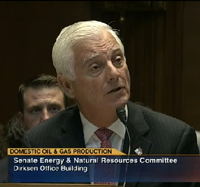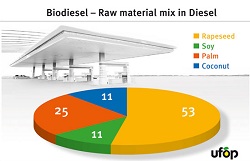 Jatropha plants with their high oil content are seen as potentially a good alternative to some food crops as a feedstock for biodiesel. But the shrub’s nature makes it just as intensive to raise as a food crop, as well as having issues with drought resistance. Researchers at Penn State University believe they have found the gene that will help them discover a way to allow the plant to be grown with less maintenance in more desert-like conditions.
Jatropha plants with their high oil content are seen as potentially a good alternative to some food crops as a feedstock for biodiesel. But the shrub’s nature makes it just as intensive to raise as a food crop, as well as having issues with drought resistance. Researchers at Penn State University believe they have found the gene that will help them discover a way to allow the plant to be grown with less maintenance in more desert-like conditions.
“It is thought that Jatropha’s future lies in further improvement of Jatropha for large-scale production on marginal, non-food croplands through breeding and/or biotechnology,” said John E. Carlson, professor of molecular genetics at Penn State. “The more that is known about the genetic basis of Jatropha’s key attributes such as drought tolerance, the more readily Jatropha improvement will progress.”
Researchers looked at a little known gene — JcPIP1 — because a similar gene in the model plant Arabidopsis is known to play a role in drought response. They also examined JcPIP2, a potential drought response gene in Jatropha identified in 2007 by researchers at Sichuan University. They reported their findings today (July 15) in the Journal of Plant Physiology.
The JcPIP genes code for membrane channels called aquaporins, which are responsible for transporting and balancing water throughout the plant, though exactly how each gene affects aquaporin behavior under environmental stress remains unclear. However, researchers have found that JcPIP1 and JcPIP2 are expressed at different times during a stressful situation, which hints at what roles they play in response and recovery.
The researchers found that JcPIP2 was mostly active in the early stages of stress while JcPIP1 expression was greater during recovery. The timing indicates that JcPIP1 might be crucial in helping Jatropha recover from damage while JcPIP2 could play a role in prevention.











